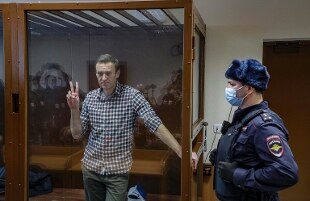Moscow, court confirms prison for opponent Navalny
Borrell: "Moscow respects the European Court of Human Rights and immediately frees Navalny"
Navalny.
Moscow: Strasbourg's release request is illegitimate and unworkable
Putin: the West uses Navalny to "stem" Russia
Navalny, Borrell: ruthless Russian authorities, dangerous slope
Share
22 February 2021 EU foreign ministers have decided to adopt new targeted sanctions against those responsible for judicial proceedings against Russian opponent Alexei Navalny and for the violent repression of demonstrators.
During the meeting of the Foreign Affairs Council a "political agreement" was reached to sanction four senior Russian officials, but "the list (proposed by the EU High Representative Borrell) is not yet consolidated", explain European diplomatic sources.
However, it is unlikely that oligarchs will be included in the list, because the restrictive measures must have a solid basis in the face of any legal challenges, and it is very difficult to establish the responsibility of the oligarchs in the affair.
Those involved in the arrest of Vladimir Putin's opponent could be hit by EU travel bans and asset freezes.
It is the first time that the new instrument of sanctions for human rights violations has been used since it was introduced.
Russia has threatened responses if new sanctions are applied.
According to European diplomatic sources, already at the meeting of EU ambassadors last week, a unanimous will emerged to move forward with targeted restrictive measures, within the framework of the new EU sanctioning regime linked to the violation of human rights.
Russia has threatened responses if new sanctions are applied.
"It is clear that Russia is on a path of conflict with the European Union" and "in the Navalny case there is a clear refusal to respect commitments, including the refusal to take into account the decisions of the European Court of Human Rights", said EU High Representative for Foreign Policy, Josep Borrell, arriving at the meeting of the Foreign Affairs Council.
After surviving poisoning with the nerve agent, Navalny returned to Russia in mid-January and was immediately arrested.
He was later sentenced to a prison term for violating probation.
He was also found guilty of "defamation" of a WWII veteran and fined 850,000 rubles (about 9,500 euros).
The EU denounced a "politicization" of Russian justice and demanded the unconditional release of the opponent, while many protests were held, to which the Russian authorities responded with thousands of arrests.

